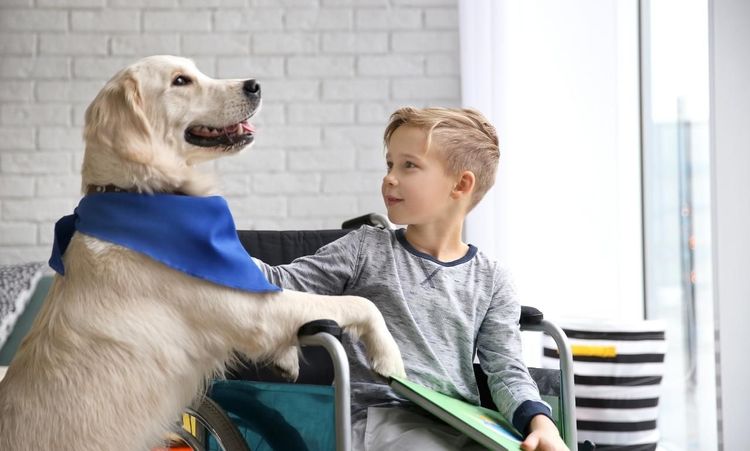If you’re dealing with anxiety and depression, a furry companion might be just what you need. Dogs are well known for their ability to provide comfort and companionship, making them excellent emotional support animals. Some dog breeds, however, are particularly well-suited for individuals facing mental health challenges. In this article, we'll explore the best emotional support dog breeds for anxiety and depression, highlighting their qualities, how they can help with emotional regulation, and tips on choosing the right one for you.
Emotional Support vs. Service Dogs

Before diving into the specifics of emotional support dog breeds, it's important to understand the difference between emotional support dogs and service dogs.
- Emotional Support Dogs: These animals provide companionship and comfort to individuals with emotional or psychological conditions like anxiety, depression, or PTSD. They do not require specialized training beyond basic obedience but are highly intuitive and responsive to their owner's emotions.
- Service Dogs: Service dogs are specially trained to perform tasks for individuals with physical or mental disabilities. They assist with tasks such as guiding individuals with visual impairments, alerting to seizures, or providing physical support.
While emotional support dogs don’t have the same public access rights as service dogs, they can still provide invaluable support and help improve quality of life. Let’s look at some of the best emotional support dog breeds for anxiety and depression.
Golden Retriever
Golden Retrievers are consistently ranked as one of the best emotional support dog breeds for anxiety and depression. Known for their loving and gentle nature, they make ideal companions for those in need of emotional support.
- Temperament: Golden Retrievers are affectionate, patient, and empathetic, which makes them a great choice for people dealing with mental health issues. Their playful antics can help alleviate stress and provide a sense of comfort during difficult times.
- Physical Needs: They require daily exercise, which can also help relieve anxiety and boost mood. Regular walks and playtime are essential for their well-being and can benefit the owner’s mental health as well.
- Training: Golden Retrievers are highly intelligent and respond well to positive reinforcement training, making them easy to train for basic obedience.
Labrador Retriever
Labrador Retrievers are another popular choice for emotional support dogs. Their affectionate nature and desire to please make them perfect companions for people struggling with anxiety and depression.
- Temperament: Labrador Retrievers are known for their friendly disposition and willingness to interact with others. Their playful energy can provide an emotional lift, while their calm demeanor can offer relief during moments of anxiety.
- Physical Needs: Labs need regular physical activity, such as walks, running, or swimming, to stay healthy and happy. This also offers a great opportunity for emotional release and stress reduction for their owners.
- Training: Labrador Retrievers are highly trainable and thrive on consistency and positive reinforcement. They are often used in therapy and as emotional support animals due to their empathetic nature.
Cavalier King Charles Spaniel
If you’re looking for a smaller dog that can provide emotional support without requiring as much physical exercise, the Cavalier King Charles Spaniel might be the perfect fit.
- Temperament: These dogs are known for their affectionate nature and their ability to form deep bonds with their owners. Their gentle and loving personality can be comforting to those dealing with anxiety or depression.
- Physical Needs: While they don’t require as much exercise as larger breeds, they do benefit from daily walks and playtime. Their low-key nature makes them ideal companions for those with mental health challenges.
- Training: Cavalier King Charles Spaniels are easy to train and respond well to positive reinforcement. Their gentle nature makes them great for first-time dog owners.
Pug
Pugs are not only adorable but also make excellent emotional support dogs. They are particularly suited for individuals who may not have the space or energy for larger breeds but still need a companion to help with mental health.
- Temperament: Pugs are known for their playful and affectionate nature. Their goofy antics can bring joy and laughter, helping to alleviate stress and anxiety.
- Physical Needs: Pugs have moderate exercise needs, which can easily be met with short daily walks and play sessions.
- Training: They are easygoing and tend to be quick learners, although they may have a bit of a stubborn streak. With patience and positive reinforcement, Pugs make great emotional support companions.
Maltese
For individuals living in apartments or smaller spaces, the Maltese is a fantastic choice. Despite their small size, these dogs have a big heart and are incredibly affectionate.
- Temperament: Maltese dogs are known for their loving and friendly nature. Their companionship can offer comfort and emotional relief for those struggling with anxiety and depression.
- Physical Needs: Maltese dogs require minimal exercise and are well-suited for indoor living. Regular walks and playtime can keep them happy and provide opportunities for their owners to reduce stress.
- Training: Maltese dogs are quick learners and respond well to positive reinforcement training. Their calm demeanor makes them great for individuals with mental health issues.
Beagle

Beagles are known for their sociable and friendly nature. These dogs can offer emotional support by providing companionship and an active presence.
- Temperament: Beagles are generally happy-go-lucky and friendly, which makes them a great choice for people dealing with depression or anxiety. Their love of socializing can help ease loneliness and improve mood.
- Physical Needs: Beagles are energetic and require regular physical activity. Daily walks and playtime help to reduce anxiety and improve their emotional well-being.
- Training: While Beagles are intelligent, they can be independent and a bit stubborn. With consistent training, they can become excellent emotional support companions.
Dachshund
Dachshunds, with their unique appearance and lovable personality, are excellent companions for emotional support.
- Temperament: Dachshunds are known for their playful nature and loyalty. Their presence can bring comfort during moments of sadness or anxiety.
- Physical Needs: These small dogs have moderate exercise needs and can thrive with daily walks and playtime.
- Training: Dachshunds are intelligent but can be a bit independent. With the right training, they can become wonderful emotional support dogs.
Shih Tzu
Shih Tzus are known for their affectionate nature and gentle temperament, making them ideal emotional support dogs.
- Temperament: Shih Tzus are incredibly affectionate and enjoy being close to their owners. Their gentle nature can help soothe anxiety and provide emotional comfort.
- Physical Needs: They have moderate exercise needs and can be content with daily walks and playtime.
- Training: Shih Tzus are intelligent and easy to train. Their love for their owners makes them incredibly responsive to training, making them excellent companions.
Bichon Frise
For individuals with allergies, the Bichon Frise is an excellent choice. These dogs are hypoallergenic, making them suitable for people with sensitivities.
- Temperament: Bichon Frises are known for their cheerful and affectionate nature. Their playful demeanor can help lift spirits and alleviate symptoms of depression.
- Physical Needs: Bichons require regular exercise, but their small size makes them easy to manage in smaller living spaces.
- Training: Bichon Frises are intelligent and easy to train, making them great companions for emotional support.
German Shepherd
If you're looking for a larger dog with the ability to protect and provide emotional support, the German Shepherd is an excellent option.
- Temperament: German Shepherds are known for their loyalty and protective nature. They form strong bonds with their owners and can provide comfort during times of anxiety.
- Physical Needs: German Shepherds require a lot of physical activity, including daily walks and playtime.
- Training: These dogs are highly intelligent and trainable, making them ideal for emotional support roles.
French Bulldog
French Bulldogs are perfect for individuals who prefer a laid-back companion with a lot of affection.
- Temperament: French Bulldogs are calm and loving, making them great emotional support dogs for those with anxiety or depression.
- Physical Needs: They are relatively low-energy and can be content with short walks and indoor play.
- Training: French Bulldogs are easy to train with positive reinforcement and are excellent for first-time dog owners.
Factors to Consider When Choosing an Emotional Support Dog

Choosing the right emotional support dog is essential to ensure a positive experience. Here are some factors to consider:
- Size: Larger breeds like Golden Retrievers or German Shepherds may require more space and exercise, while smaller breeds like the Maltese or Cavalier King Charles Spaniel are more suited for apartment living.
- Temperament: Look for a dog with a temperament that complements your personality. Affectionate, calm, and friendly dogs are great for emotional support.
- Energy Level: Consider your lifestyle and how much physical activity you can provide. Some breeds require more exercise than others.
- Training: While emotional support dogs don't require specialized training, they should be well-behaved and responsive to commands.
Benefits of Having an Emotional Support Animal
The benefits of having an emotional support animal are numerous, especially for individuals dealing with mental health challenges:
- Reduced Anxiety: Emotional support dogs can provide comfort and a sense of security, helping to reduce anxiety symptoms.
- Increased Socialization: Having a dog can encourage social interaction and help alleviate feelings of isolation.
- Improved Mood: The companionship and affection of an emotional support dog can boost mood and reduce feelings of depression.
- Stress Relief: Spending time with a dog can lower cortisol levels and provide relaxation during stressful situations.
How to Obtain an Emotional Support Animal Letter
To qualify for an emotional support dog, you’ll need an emotional support animal letter from a licensed mental health professional. This letter serves as proof that you have a diagnosed mental health condition and need an emotional support animal for your well-being.
- Consult a Mental Health Professional: Visit a licensed therapist, counselor, or psychiatrist who can assess your mental health condition.
- Get the Letter: If they determine that you would benefit from an emotional support dog, they will issue a letter outlining your need for a dog.
Conclusion
Choosing the best emotional support dog breed for anxiety and depression is a deeply personal decision. It’s essential to find a dog whose temperament, size, and energy level align with your needs. Whether it's the affectionate nature of a Golden Retriever or the laid-back charm of a French Bulldog, the right emotional support dog can offer companionship, reduce anxiety, and improve your quality of life.




